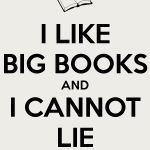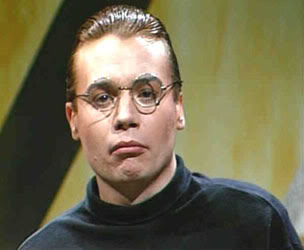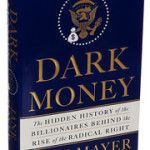Sept 12 – David Foster Wallace died 7 years ago today. Maybe died isn’t the right word, though it’s at least partly true. He killed himself; took his own life. This fact still makes me sad and angry and scared all at once.
The best way to counter these feelings is to read some of his work.<fn>If for no other reason than that his work is the only part of him that we have any legitimate claim to. Angry at the guy? Shit. I owe him.</fn> His essay from the January, 1996, issue of Harper’s, which became the title piece from his collection A Supposedly Fun Thing I’ll Never Do Again, is the single funniest and most “readable”<fn>Readable here connoting ‘something not too weird or difficult’. In fact, everything I’ve read by DFW – which is pretty much everything that’s been published plus a glimpse of a few of his notebooks at the Whitney Biennial – is terrifically readable and worth every second it takes to look up unusual words, refer to yet another footnote, or just to re-read certain sentences over and over because they are just too wonderful to take in at once.</fn> piece in his entire output. I’ve just finished it for the eleventieth time and it’s got me hungry for more. “E Unibus Pluram: Television and U.S. Fiction” is up next,and it’s sort of an essential piece for anyone interested in culture and the challenge of retaining our humanity amidst a dazzling array of shiny objects.
I find it by turns amusing and annoying that DFW is characterized as a fetish object of a hipster crowd way younger than me, that he somehow is the prototypical voice of ‘this’ generation. This is bullshit: DFW is of my generation. Our lives tracked more or less the same time span, though mine has endured a tad longer. In Infinite Jest, he wrote of a future that is more or less now; really, though, he was writing about a present-then that was the product of the culture of our childhoods.
It also pisses me royally that Infinite Jest is known as that book that everybody bought and nobody ever really read, save for a few precious bookish beardos. This tired trope likely arose from critics and other malcontents who felt the need to have/express an opinion but were too lazy to bother reading the actual book – thus inoculating themselves from accusations of laziness, because duuuuude, it’s like Finnegan’s Wake, knowhatimean?<fn>Pass the Bret Easton Ellis and the McInerney. It’s easier to chew.</fn> I grant the first 60-80 pages are little disorienting, but after that, it’s a roller coaster thrill machine that is every bit as addictive as The Entertainment that serves as the book’s macguffin. A book about addiction that is thoroughly addicting? Even better, a book that has its characters agonizing over and within their addictions while you, the reader, begin to wonder if maybe you ought to put the book down and eat or shower or go to work or something, but no, screw that, keep reading. That’s some badass legerdemain right there, people.
DFW is enjoying something of a mass(ish) cultural moment right now. There’s that movie with Jason Segal as Wallace, based on an interview transcript from the mid-90s, that has DFW’s surviving family suffering their own case of the fantods, suggesting with no small amount of justification that this kind of filmifaction of DFW is exactly the kind of mediated nonsense that he, DFW, would have hated and mocked with relentless passion. But no matter: it is, as the DC punditocracy like to say about every fabricated scandal, “out there”, and it thus seems to have generated a strange<fn>Strange because he died only 7 years ago, though it feels much longer, likely because he had been mostly silent for so long.</fn> renaissance in DFW fandomry and scholarship.<fn>Which, if you’ve read any of the scholarly work to emerge so far, is barely distinguishable from the fandomry, save a certain highly recognizable tone of pedantry apparently essential for academic publication.</fn>
Curiously coincident with the movie was the publication this year of an enormous brick – suitable for a guy who wrote the epically brick-like Infinite Jest and The Pale King – called The David Foster Wallace Reader, which presents around 1000 pages of essays, articles, short stories, and novel excerpts, and, most importantly, a few hundred pages of previously unreleased and obscurely published early works. My favorite part of the book are the notes and class syllabi he used for teaching. But mostly, I think, the people who bought it were, like me, yearning to place another DFW brick on their shelf, knowing full well that this was the closest we were going to get ever again.
I know there are other writers out there who deserve as much attention as I give Wallace. In fact, there are several who actually do get even more because of the relatively small output Wallace left behind.<fn>Rushdie, Moseley, Delillo to name a few. When do these guys ever sleep?</fn> But there is something about Wallace that drills right into my core.
Years ago, long before his death, someone asked me why I liked DFW’s writing so much. I said it was because reading him was like hearing my own voice inside my head if I had a better vocabulary and were much smarter. We were roughly the same age, grew up with the same general atmosphere of teevee, consumption, weird conformist culture, and tennis. Reading him felt like reading myself.
That was a pretty comforting thing, having someone out there grappling with the same kinds of angsty, middle-class, white boy problems, taking things on from a somewhat nerdly perspective but also bringing that weird Carlinesque outlook to the absurdities that our cossetted upbringing seemed to cultivate like mushrooms. Well, it was comforting right up until the day he killed himself. Then it became fucking terrifying.
Because here was the crux: here’s this guy, representing my mutant tribe of people who grew up inside the privilege and the comfort and the sheer whiteness of it all and knew that there was something amiss, that this incessant anomie was no accident, was actually not just a product but was actually a feature of the environment. And he saw it and got it and reported on it in a way that let us hold our deformity up for inspection and find some kind of strategy for dealing with the back-and-forth of we-have-no-right-to-complain-but-jesuschrist-things-sure-are-a-bundle-of-fuck. And in doing so, he won accolades, received a Guggenheim and a truck full of other awards. Had a fucking endowed Roy Edward Disney Chair in Creative Writing created just for him at Pomona College – dude looked like he had the world on a string.
And so one hears the news and goes, damn, that guy had it going on and I’m barely stringing a decent sentence or two together outside of my little whore gigs where I’m crafting allegedly pithy messages that are making the world a safer place for insurance adjusters or some such. And we’re the same age and have to wonder, his voice sounded just like my voice (if I were smarter &c.), and my shit’s nowhere near as together as his shit (the imagination at this point has its own engine and power source), but he took a look at it all and decided, nope, too much to bear, and took lights out. How do I measure into this equation?
Add to this that so far in that year two of my friends had taken the same way out, and that less than two months later another friend – all of us around the same damn age, mind you – made the same choice, and I gotta tell you: I was terrified.
We pretty quickly started hearing about how his was the end battle of a long life struggling with clinical depression, and that his family were not all that surprised by the event. I re-read Infinite Jest that fall and was struck by how much sadness was there. It was just bone-breakingly sad to read, so I read it again to see if I had been insane to recall the book as so wickedly funny. Turns out it was both – both incredibly funny and horribly sad and filled with almost too much truth about how we try to deal with a world that serves up both sad and funny in such apparently random and heaping servings. And that – crucially – that the only apparent strategy that made any sense was to find some way of connecting, really, with someone else. And then, to accurately describe how fucking hard that can be, to make that connection, not matter how much you know you should.
And so what does he – or at any rate, his thoughts that made it to a page – what do these ideas do for me now? I mean, crafty fking christ, if the guy who wrote the way you thought you’d like to write ends it all so gruesomely, what’s left?
Well, first I was left confused and scared and, frankly, pretty depressed. <fn>His death was not the cause of my depression, per se, but that this should have come along at a time when life was what h/we would refer to as fraught made things even more, well, fraught.</fn> But later – and especially after The Pale King came out, unfinished warts and all – I saw something else. Instead of thinking I might write that way if I were a “real” writer – and not just some ho for hire – I started to think about maybe, sort of, maybe actually being a real writer, maybe doing the hard work required to figure out if you have anything to say and the ability to say it.<fn>The jury remains forever out on this question. Ask any writer sitting in front of a blank page.</fn> But then time passed and nothing came of it and I ignored this kind of insistently annoying Epiphany-like thing that refused to be ignored. Which of course, the trying to ignore that which refuses to be ignored, only engenders more angsty fraughtness, &c.
And then, I endured My Apocalypse, and a couple of weeks after I left hospital, I was lying on the sofa in a dark room when – and I shit you not – when an entire written piece started to appear full-blown on the ceiling.<fn>And yes, there were footnotes on the ceiling, and complete sentences, too.</fn> And I rushed to the computer for like the first time in 4 months and sat down and wrote The Chronicle in its entirety and started “publishing” it in pieces on the Facebook machine. And lo, it was rough and sloppy and funny and tender, and my Epiphany-like thing just smiled quietly to itself.<fn>Some of you have read The Chronicle. It is under revision, but you got the bloggy first draft blast. You’ll tell your grandkids someday.</fn>
And here we sit, faithful denizens of this here bloggy vineyard – which by no coincidence whatsoever takes its title and raison d’ecrir from The Pale King – the words tumbling down like a poorly constructed simile on a shifting foundation of soft metaphors. And I thank DFW for his words – his Work, for it was truly some audacious labor – and for his ability to stave off his demons for as long as he did. He gave us what he had. I can miss him and wish he were still writing for us, but I can’t be angry at him for checking out. Just sad. And, oddly and thankfully, a little inspired.
So today, hot on the heels of National Suicide Prevention Week<fn>Which irony would not be lost on D.</fn>, I’ll thank all of you to remember, also, too: shit’s never as dark as it may seem. When the imagination creates it’s own dark engine and gloomy source of power, reach out. Keep going. The quest, it is infinite.







